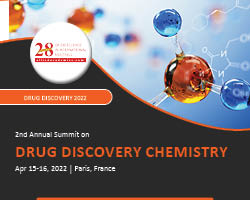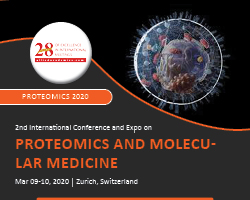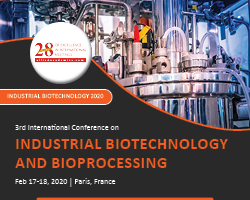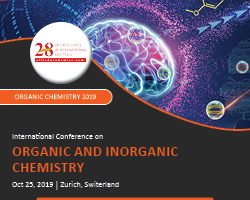2022 Conferences
2020 Conferences
2019 Conferences
Biochemistry
Allied Academies Conferences is pleased and delighted to welcomeyou all to BiochemistryConferences. It is a great platformfor academicians, researchers, scientists, clinical research organizations,pharmaceutical companies as well as industry leaders to participate and sharetheir views.
Biochemistry conferencescomprise of professional speakers, keynote speeches, verbal speeches,productive poster presentations and exhibitions and bring efficiency in thefield of biochemistry. Biochemists mustunderstand both the living world and the chemical world. It is the study ofchemical processes within and relating organisms. Principles of Biochemistryintegrates an introduction to the structure of macro molecules and have abiochemical approach to the cellular function.
BiochemistryConferences also helps to receive the intelligentinsights from some of the leading professionals and entrepreneurs from thechemistry industry, which can be a motivating factor for personal as well asprofessional growth for the students and young researchers.
Students, researchgraduates and post-docs can present poster presentations to update theirknowledge in the scientific field and increase experience in the scientificmeetings.
The significance of biochemistryis used in clinical analysis, assembling the different organic items, treatmentof maladies. Biochemistry encourages one to comprehend physiologicalmodification and biomedical changes.
Organic Chemistry is athigher echelons that enhance the intelligence and information dissemination ontopics closely related to OrganicChemistry.
They provide a uniqueforum and dedicated to scientists to express their research articles, reviewthe articles, case reports and short communications on an array of OrganicChemistry research. In Organic chemistry, current research peer-reviewedjournal is proficiently supported by universally prominent Editorial Boardmembers.
Biochemistryhas several applications in medicine, dentistry, and veterinary medicine. In food science,biochemists are used to determining the chemical balance of food and haveresearch finding to develop an abundant and inexpensive source of nutritiousfoods, develop methods to extract the nutrients from waste products, and/orinvent ways to prolong the shelf life of food products. Biochemistry spillsover into pharmacology, physiology, microbiology, toxicology, and clinicalchemistry.
In these areas, a chemist may investigate the mechanism and have a drug action and engages in theviral research; conduct research pertaining to organ function; or use thechemical concepts, procedures, and also techniques to study the diagnosis andtherapy of disease and the assessment of health.
Biochemistry tests areaimed to notice these modifications either qualitatively or quantitativelycompared to results from nutrient individuals and also deals with thestructures, functions and interactions and biological macromolecules.Macromolecules such as proteins, nucleic acids, carbohydrates and lipids, whichprovide the structure of cells and performs many of the functions associatedwith life.
The main objective BiochemistryConferences is to bring to all the fundamentalscientists, research analysts, together to exchange and offer their experiencesand research in the field of biochemistry.
It is the combinationof life sciences and chemical sciences. It explores the molecular basis andchemistry of living organisms. It uses the methods of physics, chemistry. Biochemistryhas become the foundation of understanding all biological processes and mayalso include many subtopics such as organic chemistry, bioorganic chemistry,clinical biochemistry, immunochemistry, physical biochemistry. It deals withthe structure, operates and interactions among macro molecules.
Biochemistry Conference | Proteomics Conference | Metabolomics Conference | Molecular biochemistry Conference | Structural biochemistry Conference | Metabolic biochemistry Conference | Analytical biochemistry Conference | Neurochemistry Conference | Molecular genetics Conference | Pharmaceutical biochemistry Conference | Biochemistry Conferences | Biochemistry Meetings | Biochemistry Gathering | Biochemistry Events
Biochemistry is the study biological processes at the cellular and molecular level. At the turn of the twentieth century, scientists combined chemistry, physiology, and biology to study the chemistry of biological systems, and it became a distinct field. Biochemistry has become the foundation for all biological functioning. It has aided in the understanding of the causes of a wide range of human, animal, and plant diseases.
Biochemistry is a biological and chemical science that investigates the chemistry of living creatures as well as the molecular foundation for the changes that occur in live cells. It studies the structure and behavior of complex molecules found in biological material, as well as how these molecules interact to produce cells, tissues, and complete organisms, using chemistry, physics, molecular biology, and immunological methodologies.
Mechanisms of brain function, cellular multiplication and differentiation, communication within and between cells and organs, and the chemical underpinnings of inheritance and illness are all topics that biochemists are interested in. The goal of a biochemist is to figure out how specific chemicals like proteins, nucleic acids, lipids, vitamins, and hormones play a role in these processes. The management of chemical processes in living cells is given special attention.
About Biochemistry Conferences
The staging of international gatherings to present cutting-edge research in the fields of biochemistry and molecular biology is a significant activity of the Pulsus. Each year, congresses are organized in cooperation with a regional organization and are sponsored by world-renowned biochemical societies. Additionally, each year, up to three smaller Focused webinars on specialized themes are held.
Global Biochemistry Analyzers Market
Because of their capacity to give quick and precise findings, the global biochemistry analyzers market has been prospering due to their rising use in hospitals, clinics, and laboratories. Biochemistry analyzers look for toxins in blood and urine samples that could suggest sickness. This has made the diagnosis and treatment process much quicker than before. This time has been cut in half thanks to biochemical analyzers, which benefits both doctors and patients. They're most commonly used to identify blood, urine, or saliva samples.
The need for analyzers is predicted to rise significantly as the number of tests performed on patients rises due to the rising prevalence of diseases such as diabetes, high blood pressure, kidney disease, and others. The introduction of modern biochemistry analyzers at the development stage is expected to improve healthcare outcomes for people with chronic conditions. As high-end technologies become more affordable and accessible, more people will certainly seek treatment at hospitals rather than their neighborhood clinic or doctor's office.
The need for biochemistry analyzers is increasing due to chronic illnesses such as diabetes, obesity, hypertension, kidney disease, and high cholesterol, among others, and technical advancements that are lowering prices while boosting usefulness.
The following are the regions that are projected to lead the Biochemistry Analyzers Market:
North American countries: United States, Canada and Mexico
European countries: Germany, UK, France, Italy, Russia and Turkey etc.
Asian-Pacific countries: China, Japan, Korea, India, Australia, Indonesia, Thailand, Philippines, Malaysia and Vietnam
South American countries: Brazil, Argentina, Columbia etc.
Middle East and African countries: Saudi Arabia, UAE, Egypt, Nigeria and South Africa
Biochemistry Innovations
Moosy 32Enose – An Electronic Nose: Moosy 32Enose is the first and most important biochemistry news in 2017. The Moosy 32eNose is a device developed by researchers that can assist detect disease. This innovative technology can assist distinguish between Crohn's disease and ulcerative colitis patients. The electronic nose could be used to identify pancreatic cancer or microbial pollution of water in the future.
The Hybrid-SOEC System: A team of scientists from the Ulsan National Institute of Science and Technology (UNIST) has created a new mechanism for producing efficient hydrogen. In comparison to its predecessor, this new technology, known as the Hybrid-SOEC system, produces hydrogen in a much more efficient and cost-effective manner. Its efficiency is known to be four times that of existing water-electrolysis methods.
Microneedle – Type 2 Diabetes Therapy: The following breakthrough Microneedle, an intelligent gadget, made headlines in biochemistry in 2017. Researchers have created an intelligent device that can monitor blood sugar levels and respond by releasing biochemicals to regulate blood glucose levels. These are dissolvable microneedles placed in a patch that can control blood glucose levels for a few days.
New Methods for Manipulating Nucleosides: A group of scientists at City College of New York has devised new methods for modifying nucleosides in order to efficiently and easily build complex analogues.
New DNA Hybrid Technique in Biomedicine: McGill University researchers have combined DNA with polymer particles. This innovative hybrid approach has potential applications in biomedicine, the fabrication of porous membranes, and other fields.
Nup98 Protein in Leukemia: Nup98 Protein is the next fascinating Biochemistry news for 2017. A new study has shown the mechanism by which blood cells mature and differentiate into specialized cells. This study was discovered to be mediated by a protein known as Nup98, which served as a control point for the movement of molecules from the nucleus. In addition, the mechanism that disturbs this process, allowing leukemia to develop, was discovered.
Production of Digoxin by Gut Bacteria Protects Heart: The latest biochemistry discovery in 2017 comes from Harvard University researchers who explored how gut bacteria communicate with each other and their hosts. It was revealed that gut bacteria produce Digoxin, which protects the heart. They also discovered how a protein produced by intestinal microbes was able to degrade an amino acid found in eukaryotes but not bacteria.
Metagenome Sequence Data for Identifying Protein Structures: unknown protein structures thanks to computational tools that assisted in the collection of a wide range of protein sequence data.
Innovation in Drug Designing Protein Structures: The Scripps Research Institute discovered unique structural properties in a key protein utilized in medication creation. Scientists will now be able to investigate novel approaches to target diseases as a result of this discovery. This protein is responsible for approximately 40% of pharmacological targets. The study goes into detail about the structure of this protein in order to disclose it signaling mechanism.
Breakthrough Diagnostic Tool for Neurodegenerative Disorders: Scientists at Sweden's Linkoping University have produced glowing molecules in the brain that can distinguish between different proteins. This innovative technique has the potential to be employed as a diagnostic tool for neurodegenerative illnesses. The method is based on tracer molecules that recognize and bind to specific proteins before emitting light and creating a shine.
Accurate Biomarkers Diagnostic Test for DNA Damages: The next groundbreaking biochemistry news in 2017 is that researchers at Georgetown University have developed a revolutionary high accuracy diagnostic test for biomarkers that could potentially determine which substances can cause DNA damage leading to cancer in humans.
Importance of Biochemistry in world
Biochemistry Conference | Proteomics Conference | Metabolomics Conference | Molecular biochemistry Conference | Structural biochemistry Conference | Metabolic biochemistry Conference | Analytical biochemistry Conference | Neurochemistry Conference | Molecular genetics Conference | Pharmaceutical biochemistry Conference | Biochemistry Conferences | Biochemistry Meetings | Biochemistry Gathering | Biochemistry Events
In our daily lives, we need to know about biochemistry. It benefits agriculture, medicine, and medical treatment. The following are some of the reasons why Biochemistry is so important:
Biochemistry can help you boost the yield of your crops.
It is necessary for improving land quality by preserving vegetables and flowers, as well as assisting in the production and storage of food materials.
It's critical to comprehend the operations of a large number of genes, as well as their interactions with enzymes.
It can be used to figure out what animals need in terms of nutrition. It helps to ensure enough nutrition and the prevention of malnutrition.
Geneticists use metabolic reactions to study heredity in plants and animals.
It assists the pharmaceutical sector in the discovery of novel medications.
It discusses how to correctly take drugs.
It is useful in the treatment of both humans and animals who are ill.
It contributes to the development of advantageous animal breeds and nutrition, as well as the investigation of herbicide and pesticide activity.
Biochemistry Conference | Proteomics Conference | Metabolomics Conference | Molecular biochemistry Conference | Structural biochemistry Conference | Metabolic biochemistry Conference | Analytical biochemistry Conference | Neurochemistry Conference | Molecular genetics Conference | Pharmaceutical biochemistry Conference | Biochemistry Conferences | Biochemistry Meetings | Biochemistry Gathering | Biochemistry Events
The key competitors in Biochemistry Analyzer
Some of the key stakeholders effective in the global biochemistry analyzers market are as follows
Abbott Diagnostics
Awareness Technology, Inc.
Beckman Coulter, Inc.
Erba Diagnostics Mannheim GmbH
Hologic, Inc.
Nova Biomedical Corporation
International Biochemistry Associations
Biochemistry Conference | Proteomics Conference | Metabolomics Conference | Molecular biochemistry Conference | Structural biochemistry Conference | Metabolic biochemistry Conference | Analytical biochemistry Conference | Neurochemistry Conference | Molecular genetics Conference | Pharmaceutical biochemistry Conference | Biochemistry Conferences | Biochemistry Meetings | Biochemistry Gathering | Biochemistry Events
American Society for Biochemistry and Molecular Biology
Biochemical Society
Federation of European Biochemical Societies
International Union of Biochemistry and Molecular Biology
ACS, Biological Chemistry Division
Society for Molecular Biology and Evolution
Best Global Universities for Biochemistry
Biochemistry Conference | Proteomics Conference | Metabolomics Conference | Molecular biochemistry Conference | Structural biochemistry Conference | Metabolic biochemistry Conference | Analytical biochemistry Conference | Neurochemistry Conference | Molecular genetics Conference | Pharmaceutical biochemistry Conference | Biochemistry Conferences | Biochemistry Meetings | Biochemistry Gathering | Biochemistry Events
Harvard University, USA
University of Tokyo, Japan
University of California - San Francisco, USA
University of Cambridge, UK
University of Oxford, UK
University of Toronto, Canada
Karolinska Institute, Sweden
University of Munich, Germany
University of Copenhagen, Denmark
Hebrew University of Jerusalem, Israel
Join us annually at Biochemistry Conferences!
Pulsus offers an exciting agenda that includes in-person and virtual sessions, talks by the field's foremost experts, interactive workshops on the latest trends, technologies, and techniques, and an energizing exhibition of posters, services, and products, all with the goal of sharing the latest and most impactful research findings in the molecular life sciences.
Biochemistry researchers from academia and industry, instructors, trainees, and students from all around the world are welcome to attend our annual conferences mentioned below. It provides unrivalled collaboration, networking, and recruiting opportunities.




